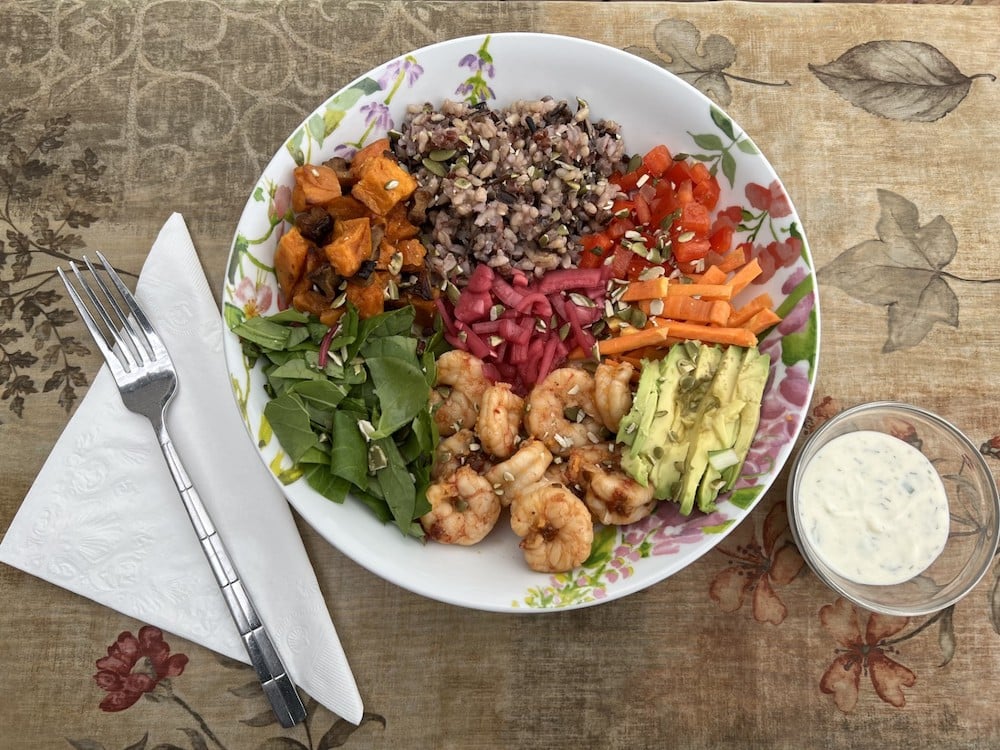
Share this post!
We talk a lot about the physiological benefits of whole foods in the Natural Food Chef program. After all, the science behind healthy foods is the foundation of what we study and why we cook therapeutically. And the benefits of learning traditional methods of cooking and connecting to the roots of our ancestors through sacred recipes can have profoundly positive emotional effects. Foods – and recipes passed down from generations – can nourish on all levels. Recipes from around the globe allow us to travel without leaving our kitchens, and to connect with rich cultural and healing traditions.
This is such a recipe. It comes from Anomarel, a professional baker and chef, who learned it from his Romanian grandmother.
“This [eggplant relish] is more about method than quantity,” Anomarel says. “For my grandma’s gypsy Romanian family, eggplant relish was sacred. There were clear rules for every stage of the recipe, each to be followed with precision. The most important of these rules: No Metal. Garlic is minced with a wooden mallet, eggplants with a wooden knife. After experimenting, I have to say I’ve learned from these traditional rules. The end result is a very light, smooth, and fluffy mixture with a very deep, distinct taste.”
Why we love this recipe:
- Eggplants are high in fiber and low on the glycemic index.
- The recipe’s generous dose of extra virgin olive oil provides healthy fat, including oleic acid, which promotes cardiovascular health and improves insulin resistance.
- Because the olive oil is not heated in this method, all of its beneficial polyphenols that can be destroyed by heat remain intact.
Ingredients:
- 2 medium sized purple eggplants
- 8 cloves of garlic (or more)
- 100-200g of olive oil (anywhere from ½ cup to just under 1 cup)
- 2 to 3 lemons, juiced
- Salt and white pepper to taste
A few notes:
- Traditionally, this dish is served as part of a larger mezze spread, alongside other dishes like grilled bell pepper salad, roasted liver salad, pickles, and a salad of fish roe called icre.
- Choose deep purple eggplants that are smooth-skinned and even-colored. You’ll know they’re right for this recipe by pressing the skin with your finger. If it springs back and leaves no indentation, the eggplant is ripe. They should feel light for their size: light, large eggplants are sweeter. Heavier eggplants can be bitter.
- A ceramic knife can be used in place of a wooden knife.
Directions:
1) Roast eggplants on a real barbeque with coals from a wood fire, until their skins are black and starting to peel. Cut each in half, and scrape out the inner meat. Put the eggplant meat in a colander, and let the fluids drain for at least 3 hours.
2) Pound garlic to a fine mince with a wooden mallet or the flat side of a wooden knife.
3) Spread the garlic over the eggplants.
4) Pour about a third of the lemon juice onto the eggplants, and use the wooden knife to mix the garlic and lemon juice in a ‘fold-and-chop’ movement. From this point on, the technique is to fold and chop with the wooden knife while adding the olive oil and the rest of the lemon juice interchangeably. The objective is to create an emulsion between the olive oil and lemon juice that will tie them to the eggplant. Add the salt and pepper about 2/3rds of the way into the process. It should take about 20 minutes to blend the oil and lemon.
Image: Cemre/Shutterstock.com
Share this post!


















